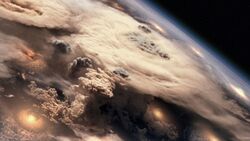UnNews:Meteorologists find partially fossilized remains of cloud
| UnFair and UnBalanced | ✪ | UnNews | ✪ | Thursday, February 26, 2026, 18:02:59 (UTC) |
| Meteorologists find partially fossilized remains of cloud | 
|
May 31, 2009
LINCOLN, Nebraska - When Omaha, Nebraska weather specialist Rob Humbert returned to his home in Lincoln to dig up a time capsule, hardly did he expect to find hidden in the dirt the gem he discovered. "It was puffy and grey; I uncovered a portion of it with my spade, and I just pulled the rest of it out of the ground," he recalled in an exclusive interview.
Humbert's team of meteorologist students at Lincoln University gathered around the specimen and identified it as being a distant ancestor of the "stratocumulus cloud", which is an omen of light rain, and the "pyrocumulus clouds" that can be seen hanging over volcanic eruptions. This confirms the long-held theory that pyrocumulus clouds descended from the mountains as they ran out of smoke and ash particles upon which to feast. Gradually, they adapted to a diet consisting entirely of water vapor.
Most pyrocumulus clouds died out with the decline in volcanic eruptions, though the California wildfires conservation program has restored much needed pyrocumulus food to the ecosystem. This newly discovered species, christened "Pyrostratus cumulohumbertus", will provide highly needed material for genome analysis. With this, scientists can better visualize how the pyrocumulus and statocumulus species evolved into their present states.
"This is the hugest meteorological find in the past century," Humbert's team boldly announced. Humbert has already sold the book, movie, Broadway play, and merchandising rights to the finding. Caution against getting too excited is strongly discouraged. Though Humbert confides, "I never did find that time capsule with my porno mags."
